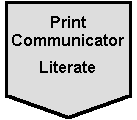|
FIVE
LEARNING STYLES
There
are five basic learning styles that affect how information if
processed by individuals based on their level of literacy. This is
crucial in making certain the Gospel is "heard" by those to whom we
desire to communicate God's truth. |
Illiterate:
 |
- Cannot read
or write
- Has never
"seen" a
word
- Words have
no exact
meaning
- Words are
bits of sound pictures, not
objects
- Oral
communicator
- The story
is their dominant communication
style.
|
FUNCTIONAL
ILLITERATE:
 |
- Began to
read, dropped out of school by 8th grade, stopped reading and
writing
- Two years
later may read and write simple materials but no longer
receive, recall, concepts, precepts, or principles, even if
they did originally
- Values or
not transmitted through literate
means
- They are
considered to be literate by every country
- The story
is their dominant communication style - they are Oral
Communicators
|
SEMI-LITERATE:

|
- Progressed
to 10th grade, usually a high school graduate
- Function in
gray transition zone between orality and literacy
- May only
use marginal skills in one context (work for instance)
- Considered
to be literate by every country and every school system
- Prefers
oral to literate communicatioin
- Learns best
and most comfortably through oral presentation style
|
Literate
(or Functional Literate):
 |
- Continued
to use reading and writing beyond 10th grade
- Can
summarize what they read or heard and list important
points
- Does not
depend on number of years of
schooling
- Comfortable
with information presented in literate format
- Learns and
handles concepts, precepts, and principles presented in this
manner
- Still
retains and appreciationi for oral communication and responds
to it with understanding
|
HIGHLY
LITERATE:
 |
- Spends much
time daily developing and using reading and writing
skills
- Has usually
attended
college
- Are often
professionals in liberal arts
fields
- Has
surrenered oral communication
skills
- THOROUGHLY
WORD-CULTURE PEOPLE, LITERATE COMMUNICATOR
- Still
retains appreciation for oral communication and responds to it
with understanding
|
| |
|
![[Company Logo Image]](../../images/Bias-t1smallerfile.jpg)
